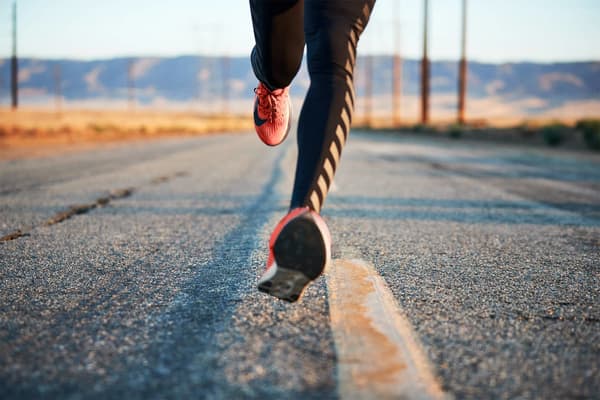How Many Calories Should I Burn in a Day? Experts Say the Answer Is Complicated
Nutrition
Experts identify all of the variables that go into assessing how many calories you should aim to burn (and eat) in a day. Here's why the question is largely irrelevant.

If there's one metric society tends to measure food with, it's calories.
Scan the nutrition labelling, such as the Nutrition Facts label in the US, on the back of most packaged food items and you'll see their total calories—a figure based on a 2,000-calorie-per-day diet, as the label will probably also note in a tiny disclaimer font.
Calorie counting, or burning, has often been used as an indicator of how "successful" a workout was—hop on a treadmill or elliptical and the machine will often display how many calories you've "burnt" while on it. Many wearable fitness trackers also claim to know the number of calories a person can burn throughout the day.
In short, it's hard to escape discourse around calories in the fitness world. But when it comes to using that metric as a means for improving, and measuring, your health, counting calories is pretty much useless, says Robert H. Lustig, MD, MSL, a paediatric endocrinologist and author of "The Lure and the Lies of Processed Food, Nutrition, and Modern Medicine".
He explained that calorie consumption and expenditure are part of a person's overall metabolic processes, or metabolism, and are highly dependent on the person's genetics, age, environment and the chemical make-up of the foods they consume.
In other words, how many calories you should consume, and burn, per day is irrelevant. Below, Lustig breaks down what a calorie is, its relation to your metabolism, and how to fuel to stay energised and strong.

What those calorie recommendations really mean for you.
The US Dietary Guidelines for Americans recommends that children and adults consume calories based on their age group, sex and level of activity, which is anywhere between 1,600 and 3,000 calories, depending on where you fall on that scale.
But while calories, and the notion of a 2,000-calorie-per-day diet, continue to be a part of dietary and health guidelines in the US, it's important to note that the creators of the concept had a much less health-centric aim in mind in 1896—which is when this proposed number of calories per day was first introduced. The calorie was meant to provide a quantifiable way of mass-feeding children in schools, members of the army and inmates. (In other words, it could help the government save time and money when feeding large groups of people.)
For someone who is looking to measure, and maximise, their food intake, the definition of a calorie comes down to your overall energy needs, explains Uma Naidoo, MD, author of "This Is Your Brain on Food". "Calories ultimately provide the body with energy to power through each day", she says. "When we don't consume enough calories, our organs and physiological systems cannot function properly".
And from a more technical, anatomical perspective, Lustig says that the proper functioning of those physiological systems, or your metabolism, comes down to cellular function.
"Simply put, metabolism means taking stuff from outside your body and using it on the inside of your body", he said, but added that the "outside" stuff isn't just food—it's oxygen, water and vitamins, too. "Anything that comes from the outside promotes either growth or burning [in our cells]. That's metabolism".
However, Lustig says that food is the primary instigator for both the growth and burning of cells. He adds that protein—or, rather, the amino acids (aka the building blocks of proteins)—is one of the quintessential "growers" for cells. He noted that this is why people trying to pack on muscle will up their protein intake.
But as for cells knowing when to use food to grow or burn, "that's sort of the magic of metabolism—the secret sauce", Lustig says.
What causes metabolism to function differently?
As Lustig explains, the reasons a person's metabolism might be moving faster or more slowly than another individual's is highly dependent on a number of factors. But the definition, according to him, is fairly clear: a slow metabolism is a result of cells with inhibited mitochondria.
"Your mitochondria turn food into energy", he says. "When your mitochondria are working poorly, we say you have a slower metabolism".
As for what can cause a cell's mitochondria, or a person's metabolism, to slow down, science has a few theories. A study published in October 2021 found that a person's metabolism fluctuates most with age—but not with the steady decline through the years as previously thought. Children between 1 and 15 months old have a metabolism that functions roughly 50 percent faster than an adult's. Beyond that point, metabolic function gradually decreases (but not by much) until a person turns 20, then plateaus until the 60s, where it begins to decline again.
Importantly, the researchers added that the primary reason the men in the study had faster metabolisms than women was due to their having a higher proportion of muscle tissue overall. In other words, sex alone didn't dictate metabolism speed. Certain health conditions, such as diabetes and hormonal disorders, have also been found to affect a person's metabolism.
Lustig pointed out that, overarchingly, everyone's temperatures, or metabolism, have been dropping over the past century and a half.
"Body temperature is made by heat that is released by the mitochondria to function", he explained. "So if you have a lower body temperature, your mitochondria aren't working as well".
So, how many calories should you burn daily then?
The answer? It doesn't really matter all that much. Here's why: how a person's metabolism functions is, in some part, unknown. And by association, counting how many calories you eat or "burn" throughout the day isn't always helpful with regard to overall health. And in the case of eating disorders, that advice can be dangerous when calorie restriction and expenditure become too emphasised.
Rather, as Naidoo says, it's important to consider what you're eating (aka the quality of the calories), rather than obsessing over the number of calories.
"While all calories contain the same amount of energy, the way that the body processes and reacts to calories is vastly different", she says.
(Related: Should You Eat Breakfast Before or After a Workout?)
In that same vein, how many calories you should burn with exercise is less important than simply exercising. For starters, caloric burn can often be overestimated with exercise, as one 2017 study observing the effectiveness of fitness trackers found. But as the Physical Activity Guidelines for Americans, 2nd. edition noted, the incentive to move should be centred more on what exercise can give you versus what it takes away.
That's because 150 minutes to 300 minutes of moderate-intensity, or 75 minutes to 150 minutes of vigorous-intensity aerobic exercise per week—with a combination of muscle-strengthening exercise on two or more days of the week—is associated with an abundance of health benefits. These benefits include stronger stress management, a boost in energy, improved sleep and a reduced risk of chronic diseases, as stated in the guidelines.
High-quality foods to reach for.
Naidoo recommends reaching for foods throughout the day that are low glycaemic, or are the least likely to cause blood glucose (sugar) levels to spike dramatically. This includes vegetables, berries, lean proteins such as turkey, chicken and fish, as well as "healthy" fats, such as those found in avocado, anchovies and sardines, and certain nuts and seeds, including walnuts, macadamias, almonds and cashews.
(Related: Dietitian-approved, High-Protein Snacks to Eat After a Workout)
These types of low-glycaemic foods, Naidoo explains, will help keep your energy levels stable throughout the day. She adds that foods that foster a "healthy microbiome", or keep your gut happy and discomfort free, can also help.
"A healthy, balanced gut microbiome is associated with good cellular integrity, optimal nutrient absorption, elevated energy levels and efficient digestion", she says. "However, an unhealthy microbiome is associated with leaky gut, poor nutrient absorption, fatigue and slow, potentially uncomfortable, digestion".
That said, Naidoo emphasises that food consumption is highly individual—and the type of nutrients one person should have in abundance might not be suitable for another. Working with a registered dietitian can help you tailor a plan that best suits your needs.
"It is important to be eating sufficient amounts of healthy whole foods to nourish our body and mind, but due to the unique microbiome and metabolisms we each have, our responses to food vary", she says.
The bottom line.
Calories aren't the villain. And for many people, doctors and government bodies, they can be a helpful tool in understanding (generally) the energy contained within certain types of foods and beverages.
But, en route to most people's health goals, meticulously counting calories is a far less effective strategy than, say, choosing foods to consume based on their nutrient make-up—or simply because that food gives you joy. And the same concept applies for exercise. The Physical Activity Guidelines mentioned earlier list gardening and walking as a form of moderate-intensity aerobic activity, so in order to reap the health benefits associated with exercise, the way in which you need to move is fairly open-ended.
Words by Julia Sullivan, ACE CPT.





